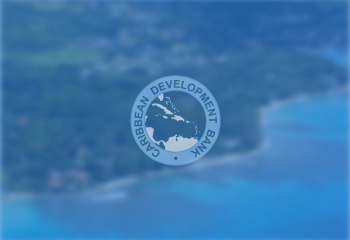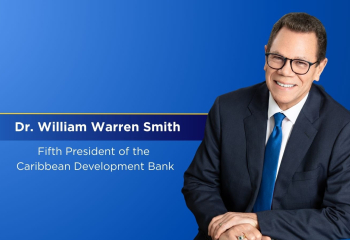BRIDGETOWN, Barbados - The Caribbean Development Bank (CDB), Caribbean Community Climate Change Centre (CCCCC); Caribbean Institute for Meteorology and Hydrology (CIMH); Caribbean Disaster Emergency Management Agency (CDEMA) and Caribbean Catastrophe Risk Insurance Facility (CCRIF) gathered in Barbados last week for a meeting with Secretary-General of the United Nations, Ban Ki-Moon, to discuss a common agenda for handling climate change impact.
“Regional organizations are critical to moving this agenda forward - and realizing the development priorities of the Caribbean. The region has made progress in achieving the MDGs - but a number of challenges including a high debt to GDP ratio, low growth and youth unemployment. At the same time, the impacts of climate change are not only environmental but social and economic, exacerbating economic challenges that face the region, regardless of the fact that many Caribbean countries are middle income countries. Despite these challenges the region is still standing ahead of others," said Ban Ki-moon.
Stakeholders acknowledge that smart, sustained investments are needed if vulnerable nations in the Caribbean region are to combat and confront climate change successfully.
“Caribbean countries face serious structural, economic and social challenges that must be addressed as we build resilience to climate change. substantial climate finance is urgently required. CDB has been emphasizing support for the rebuilding of infrastructure to higher standards. However, we could make a more significant contribution to the Region' efforts in both disaster risk reduction and climate change adaptation, if adequately resourced," said Dr. William Warren Smith, President of the CDB.
CDEMA, the regional disaster management body for the Caribbean, underscores that financing is key to the bolstering small islands' climate change response.
“A major challenge to the region is the graduation of a number of CARICOM small island developing states from being able to access concessional financing from international financial institutions while facing constraints over which they have limited or no control. The space therefore exists for facilitation of direct access to UN technical and financial assistance by CARICOM regional institutions," said Ronald Jackson, Executive Director, CDEMA.
CIMH notes that climate policy coordination with a focus on high-quality data and analytics is critical to helping Caribbean nations become more climate-resilient.
“A significant amount of historical data at national levels has not been converted into electronic formats due to resource constraints and limited know how. Increasing support for data capture will be required in order to build resilience to extreme weather and climate events and sustain development. New or updated policies governing information sharing are needed. UN agencies in partnership with national and regional organisations should work more closely to source funding for data integration and analysis programmes if SIDS, Least Developing Countries and Developing Countries in the region are to maximize the benefits of Big Data and analytics to guide their future development plans under uncertain climatic conditions," said Dr. David Farrell, the Principal of CIMH.
It is expected that Caribbean nations, which are especially vulnerable to climate change impacts, will require unprecedented financing to ensure climate-resilient economic growth.
“Building climate-resilient, low carbon economies in the Caribbean will require a transformational change by national governments, regional organisations, NGOs, the private sector and civil society supported by an unprecedented level of financial and technical assistance," said Dr. Ulric Trotz, Deputy Director & Science Adviser to the 5Cs.
The Caribbean Region has already seen the impact of climate change evidenced in changing weather patterns. CCRIF, which provides hurricane, earthquake and excess rainfall insurance for 16 Caribbean Governments, to date, CCRIF has made 12 payouts for hurricanes, earthquakes and excess rainfall totaling approximately USD35.6 million to eight member governments.
“Climate change and the increase in the number and severity of storm events calls for upscaling of coverage by member countries and for coverage by non-member countries which are vulnerable to these hazards. . key areas of support include further capitalization of CCRIF for current or future products or direct country support for purchase of premium; and support for governments in identifying and delineating public and private responsibilities for disaster risk management," said Isaac Anthony, Chief Executive Officer of CCRIF.
From November 30 to December 11, 2015, 40,000 people, including country delegates from the Caribbean, observers and civil society organisations, will gather in Paris for a milestone United Nations Climate Change Conference to discuss a new international agreement to combat climate change.
“As we look to the immediate horizon, we see a post-2015 development agenda coming into view. It will be a transformational and people-centred agenda, with the proposed 17 SDGs the likely core of the plan. The UNFCCC process continues in parallel. The Paris Climate Summit will be an important opportunity to highlight the region' concerns. Regional entities with a much more focused understanding of the issues will have a very important role in this process. As we go forward, the UN stands ready to support your organizations and to work in concert to advance the goals and aspirations of the Caribbean region. We rely on you as the bridge builders between local concerns, the regional landscape, and the international arena," said Ban Ki-moon.
The Secretary-General was in Barbados July 1-3, 2015, to address the opening of the 36th Summit of the Caribbean Community (CARICOM). During his visit, he opened the Caribbean Sustainable Development High-level Dialogue, which focuses on partnership between the United Nations and CARICOM on the Post-2015 development agenda and climate change.


